- Home
- Andrew McGahan
1988 Page 2
1988 Read online
Page 2
I ran through my list of friends and acquaintances. There was only one who I thought might be interested on a slow weekday afternoon. His name was Leo. He was a bank teller who’d quit work and was waiting now to start university. I dialled his number.
‘Leo,’ I said, ‘It’s Gordon.’
‘Gordon. What’s news.’
‘Nothing. You interested in a few drinks this afternoon?’
He was yawning. ‘Well . . . what’d you have in mind?’
‘Just a beer or two.’
‘Where?’
‘Here. Or down at the pub.’
‘What about coming over here? My parents are away for the week, I’ve got the house to myself.’
I thought about it. Leo lived with his parents, out in the suburbs. It was a large, two-storey brick house. Inside was scrupulously neat. Somehow I never felt relaxed visiting there, parents or no parents.
I said, ‘You’re not interested in coming over this way?’
‘I’d just as soon hang around here.’
‘Well, I don’t feel much like moving myself.’
‘That’s that then.’
‘Guess so.’
‘I don’t really like drinking at your place all that much Gordon. It’s always so bloody crowded.’
‘The Chinese are out at the moment.’
‘They’ll be back.’
‘I guess they will.’
‘It’s a shitful day for it anyway.’
‘Yeah.’
We talked a while longer, hung up. I thought about a few other people I could try, lost interest. It was a shitful day for it. I got up and made for the toilet. Leo was right about the other thing too. The house was too bloody crowded.
In the end we had nine Chinese students living there. The floors of their two rooms were covered with mattresses, and they took the sleeping in rotation. They paid ten dollars each in weekly rent. During the day they filled up the living room and the kitchen, cooking, talking, poring over the job columns. Nine lean, dark, Y-fronted bodies. William had lost control. He sat on his chair and smoked endlessly and stared at the television. He’d never been a talkative man, now he said nothing at all.
I spent the days wandering about the house, dodging the Chinese, ignoring them and ignored by them. Eleven people in residence and I felt as if I was living alone. I wasn’t even sure this type of mass-rental was legal. But although a few of the Chinese did manage to find part-time work, they remained desperately poor. Even ten dollars a week was a burden to them. Where else were they going to go?
At least their social lives were improving. They started bringing women home. Female Chinese students. The boys pooled their resources and bought six-packs of beer and extra cigarettes when they entertained. An ancient Chinese woman began appearing whenever the girls did. Some sort of chaperone, I assumed. Several times she took it upon herself to clean our kitchen, shooing William and his marijuana out with her broom. The Chinese, both men and women, apologised. They said they didn’t like the old woman, didn’t even want her there. They asked William to make her go away. He only looked at them, then took his television off to his bedroom and brooded.
Increasingly I retreated to my room. I stopped using the kitchen. I ate meat pies and fish cakes and chips from the takeaway. Greasy wrappers and small piles of salt gathered around my bed. I switched on the computer from time to time, switched it off. I lay and stared at the ceiling, listening to the Chinese outside my door. Went to work at the pub, came home. Nothing much else happened. December passed into the New Year, the New Year into late January. And then it was February. The ninth or the tenth or the eleventh.
I stared into the toilet as I pissed. The water in the bowl was a dark yellow, the smell of urine enough to make me gag. That was the Chinese again. They only flushed for shits. I understood that. Shanghai was a massive city with water-supply problems, you didn’t waste water on unnecessary toilet flushing. It was small of me to be squeamish. It showed a lack of cultural tolerance. But still, eleven people had pissed in that bowl. I finished, pressed the button and got out of there.
Someone was knocking on the front door. I moved down the hall and opened it. It was a Chinese man, young, unfamiliar.
‘Hello,’ he said.
‘G’day.’
He held a suitcase in one hand, and a piece of paper in the other. He lifted up the paper and read out a street number. ‘Is that here?’
‘Yes.’
He grinned. ‘I come from airport. I told I live here.’
‘You live here?’
‘My friends live here, yes?’
‘I guess they do.’
‘Then I live here.’
We looked at each other. He laughed nervously. It was a new country and a new town and he was all alone. I wasn’t giving much of a welcome.
I sighed. ‘Come on in.’
He followed me down the hall. I showed him the bedrooms. ‘In there. They’re all out at the moment.’
‘They will be long?’
‘No idea.’
I sat on the living room couch. He put his suitcase just inside one of the bedrooms, then stood, looking around. Finally he sat on the edge of one of the other chairs, hands on his knees. We were silent for a minute, avoiding each other’s eyes.
‘This is nice house,’ he said, and smiled at me.
‘Yes,’ I said. I didn’t smile back.
It was time, I decided, to move.
TWO
I saw Wayne a few days later.
At the time I barely knew him. He was a struggling artist, and I had no real interest in art, struggling or otherwise. But we had a friend in common, a woman named Madelaine. She was an advertising copywriter. Both Wayne and I had been through brief affairs with her, about a year before. Possibly she had a thing for failed artists and writers. Possibly they had a thing for her. She was generous and good-natured, lived in a nice house in Nundah, and her fridge was always full.
There was a party at Madelaine’s house. It was Friday night and I’d just finished an eight-hour shift at the bottle shop. I arrived in my black pants and white shirt, my legs aching, a bottle of bourbon tucked under my arm. It wasn’t a big crowd, a dozen or so people. University students, a few unemployed, some of Madelaine’s fellow workers. They weren’t my regular friends, but I knew most of the names and faces, enough to be at home.
Wayne was there. He was older than me, somewhere in his mid-twenties. I’d seen him three of four times before, around Madelaine. He certainly looked like an artist. His clothes were always soft and loose, his skin was pale almost to the albino stage, and he was tall, narrow-faced, with a head of untidy, bright blond hair. It was hard to say if he was attractive or ugly, but you could imagine him at the canvas, slapping the paint on. Either way, I’d never said more than a few words to him, or him to me.
I sat on a couch, let the first few bourbons seep down to my feet. It was good to be finished with work for the day, even better to be away from my house and its population explosion. I still didn’t know what to do about it. Move certainly, but there was more wrong with my life than just where I lived. I was bored. Failure was the problem. I’d always expected success at something, sooner or later. I was sick of waiting.
Madelaine flopped down beside me.
‘Gordon,’ she said.
‘Madelaine.’
‘How are the Chinese?’
‘I’m leaving them.’
‘Really? Where’re you gonna go?’
‘No idea yet.’
‘It’s a pity. I like visiting your house. They’re interesting people. Amazing stories about Shanghai.’
‘I’ve never really got that far with them.’
‘You just have to ask.’
I shrugged. ‘Do you know anyone who has a spare room?’
She thought. ‘Not really. But I’ll ask around. I’ll find you something.’
We talked about other things. I liked Madelaine, without really understanding her. She was a roun
d, curly-haired, motivated woman. Twenty-seven-years old. Apart from working at the ad agency she also studied literature part time at uni. That was how we’d met. We’d been in a tutorial together, then one day she asked me out to a pub. We’d got ourselves drunk, and got along. Then I’d left uni and started writing, but we still met from time to time. And when the writing started to die she was sympathetic. About the writing, and about other things.
That was how the fucking had started. I was lonely and losing it a little, and she’d known that. She’d also known that I’d go home quietly each morning, after the asthma attack, and cause her no trouble. So she’d taken me to bed. But sex was a problem with me. Madelaine was the fourth woman I’d tried it with, only the second with whom it had lasted more than a couple of nights. I was clumsy and shy. My penis was very small and I always came quickly. I was ashamed of it. Ashamed of my whole body.
Nor did I have any real idea of what to do with hers—her big breasts, her wide legs, her clitoris, anything. In all our time together she never came. She was very friendly about things, but that only made it worse. I didn’t seem to learn anything or get any better. There was more to sex, I knew, than just pricks and cunts, but somehow the rhythm of it, the whole fuck that was supposed to be there—I couldn’t get the hang of it. I didn’t know why. After about a month I suggested that maybe we should stop. I was still lonely, and I still craved sex, but there was a terrible knowledge there too. I was no good in bed. I masturbated all the time, despairingly. There’d been no one since Madelaine.
Finally she moved off to circulate. I stayed on the couch, talked with other people. The bourbon slid down. I grew drunk. Joints were being passed around but I didn’t take any. Despite living with William and his eternal supply, I smoked very little. At least, not in company, and not when drinking. It made me paranoid and sleepy. It came to me that I was living a dull and innocent life. No sex of late and not many drugs. All I could claim was a weakness of character, a poor diet, and alcohol.
Wayne sat down next to me.
‘I hear you wanna leave town,’ he said.
‘Who told you that?’
‘Madelaine.’
‘I wanna move house, that’s all.’
He was disappointed. And maybe a little stoned. He stared blankly around the room. ‘Oh.’
Wayne, in fact, had been Madelaine’s partner immediately prior to me. Exactly how things had gone with him, and why it didn’t last, Madelaine had never said. She still liked him though, and in particular liked his paintings. I’d never seen any.
I said, ‘Why?’
‘I’m looking for someone to come to a lighthouse with me.’
I considered this. I knew about lighthouses. Windswept coastlines. Rocks. Treacherous fogs. Men in thick seafarer’s sweaters.
I said, ‘What do you mean, a lighthouse?’
He dragged his hand through his hair, glum. It was a long, slim, artist’s hand. ‘You know, a lighthouse.’
‘Where?’
‘The Northern Territory.’
‘Jesus.’
‘Yeah.’
‘What are you supposed to be doing there?’
‘I don’t really know. It’s a job my father organised.’
‘Ah.’
There was a pause.
Wayne sat up. ‘It’s not in the actual lighthouse. The lighthouse is automatic. But there’s a weather station there too. I’m gonna be running that. But it’s a two-man job, I need someone else.’
I thought. ‘Do you know how to run a weather station?’
‘What is a weather station? Do you know?’
‘No.’
He nodded. ‘The jobs vacant, and my father’s friendly with the administration, that’s all I know. I’m supposed to go up there and paint. My parents think the solitude will be good for me. It’s a very lonely place, apparently.’
‘And no one wants to go with you?’
‘I’ve asked everyone. Then Madelaine mentioned you. And I thought, since you’re a writer . . . ’
‘I haven’t written anything in years.’
‘Oh. Okay.’
We sat. I sipped on the bourbon, watched the party. It was looking tired. I felt tired. Drunk. I thought about the bottle shop, my life in general. About the Chinese, ten of them now, waiting for me at home.
I said, ‘You don’t even wanna go, do you.’
‘No. But my parents have been supporting me for years. I don’t have much choice.’
That was something, at least. I could live with most things, but not enthusiasm.
I said, ‘How long would we be there?’
Wayne looked at me. ‘Six months.’
We spent the night plotting details. A lighthouse. A weather station, thousands of miles away. For six months. I drank steadily. With alcohol it all made sense. Meanwhile, the party dwindled around us. The bourbon ran out and I moved on to some leftover wine. We kept talking.
This was the only problem. There wasn’t any. Wayne had spent weeks trying to find someone for the job, now there were only nine days left before he was due to start. The first step was getting to Darwin. There was supposed to be a day’s training there, with the Bureau of Meteorology. To learn how to run the weather station.
‘Have you got a car?’ Wayne asked.
‘Yes.’
‘I don’t wanna take a bus or anything. You mind driving?’
‘No. Sure. We can drive.’
And we could. It seemed fitting. We’d drive, we’d traverse the continent. Not that we could go all the way by car. Wayne didn’t know exactly where the lighthouse was, but he did know that it was somewhere remote, not accessible by road. The only way in was by plane or boat. And it seemed that once we’d arrived, we’d be stuck there until the six months were up. There was no transport for holidays or weekends off. Only, maybe, for emergencies. Critical injuries, heart attacks, death.
Somehow it didn’t matter. I tossed down the wine, agreed to everything. Then it was five in the morning and the wine was finished. I wrote down Wayne’s phone number, called a cab and rode home. I watched the Brisbane streets roll by. Suddenly I was worried. The Northern Territory? A lighthouse? Me?
I made it home and went to bed. I lay there, thinking. I calmed down. It would be fine. Later on I’d wake up sober and decide to dump the whole idea. I slept. Got up late. The Chinese were still there. The dust on the computer was still there. The mess in the kitchen was still there. And the heat and the hayfever and the long, tedious day.
It was settled then.
To the lighthouse.
THREE
The first thing was to quit my job at the bottle shop. I worked my Saturday night shift then explained things to the boss after closing. He didn’t seem too concerned.
‘How long will you be gone?’ he asked.
‘Six months.’
‘Well, the way people come and go around here, there might be a spot for you when you get back.’
I was moved. He was from the old guard of pub-owners. Alcoholic and cynical, hateful of staff and customers alike. For him it was an affectionate goodbye. And maybe I’d earned it. I’d worked for him two years, diligently and without complaint. I was polite to customers, kept the fridges fully stocked, never called in sick or skipped shifts.
No wonder I hated the place.
Then there were things like gathering a six-month supply of asthma drugs. One of my deepest fears was being trapped somewhere inaccessible without my medication. I used far more than was necessary. I sucked on the Ventolin puffer every hour or so, automatically, whether I was short of breath or not. I hid this fact from the doctors. They were evangelical about asthma and about how to control it. I preferred not to get lectured—it was my disorder, not theirs. I visited the necessary chemists, stocked up.
Most important, though, was the collection of writing material. I’d decided it was time I started another book. More than time. Wayne’s parents had the right idea about the lighthouse. Isolation was the key
. The computer, however, was too big to take. I’d long ago sold my old typewriter. It would have to be pen and paper again.
I found a stationer’s. I went to the shelves and selected a ream of finest quality writing paper. Five hundred pages. I thought about that for a moment. Then I took another ream, and then two more. Two thousand pages. Just how much writing might I get done in six months? I took another ream. And another one. I had six of them, stacked up in my arms. I paused. What was I doing? Three thousand pages? I put two of them back. Then picked one up again.
I moved to the counter. The clerk looked at me, at all the paper. ‘Planning War and Peace are we?’
‘You never know.’
‘Anything else then?’
‘Ink cartridges for a Parker fountain pen.’
He dug around under the counter and came up with a pile of small boxes. ‘There’re five cartridges to a box,’ he said, ‘How many you want?’
‘Twenty boxes.’
He laughed. ‘Are you kidding?’
‘I’m gonna be out of reach of shops for the next six months. I don’t wanna run out of ink.’
‘You wouldn’t use that much in six years. Even if you were writing War and Peace.’
‘I still think I’ll take the twenty.’
He started packing them up. ‘Your money.’
He was right. It was getting expensive. I had only a few hundred dollars saved. With petrol and other expenses, I’d be broke by the time I hit Darwin. And what about food? How did we get food out at this lighthouse? Did we have to take six months’ worth of that as well? And what about alcohol? Where was that going to come from?
Unknowns. There was nothing to be done about them.
Madelaine rang me.
‘So you’re really going!’ she said, ‘I knew I’d sort things out. How do you like Wayne? Think you’ll get along?’
‘I don’t know. What else does he do except paint?’
‘Nothing. It’s tricky for him, his parents keep demanding he gets a real job. They don’t think he’s motivated enough. That’s why he has to go, to get them off his back. They want him to paint enough stuff for an exhibition. He can hardly say no, seeing they usually have to help him out with cash . . .’

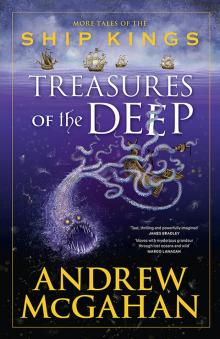 Treasures of the Deep
Treasures of the Deep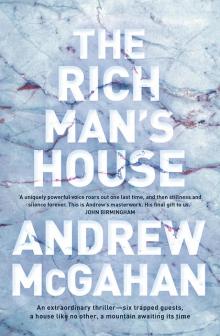 The Rich Man’s House
The Rich Man’s House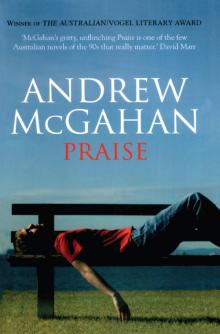 Praise
Praise The White Earth
The White Earth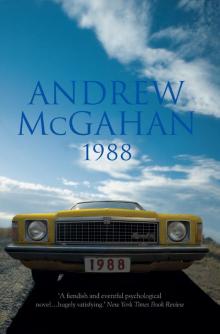 1988
1988 The Coming of the Whirlpool
The Coming of the Whirlpool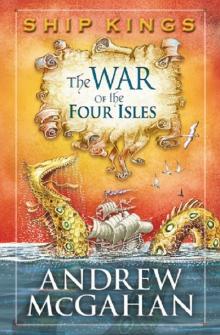 The War of the Four Isles
The War of the Four Isles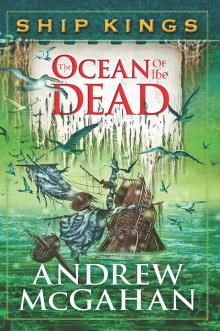 The Ocean of the Dead: Ship Kings 4
The Ocean of the Dead: Ship Kings 4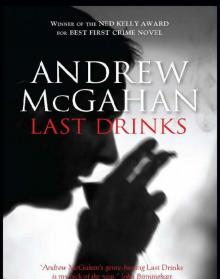 Last Drinks
Last Drinks Wonders of a Godless World
Wonders of a Godless World Underground
Underground The Voyage of the Unquiet Ice
The Voyage of the Unquiet Ice